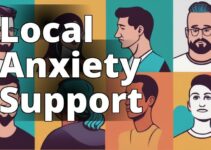Learn about Anxiety Chest Pain
- Understand the relationship between anxiety and chest pain, the symptoms, causes, and coping strategies.
- Differentiate anxiety chest pain from other conditions, know the triggers, and seek help from medical professionals.
- Discover treatment options, lifestyle modifications, and support resources available for managing anxiety chest pain.
What is anxiety chest pain, and how can individuals find relief from its distressing symptoms? This article explores the various aspects of anxiety chest pain, including its definition, causes, symptoms, management strategies, and insights from healthcare professionals and individuals who have experienced it.
Understanding Anxiety Chest Pain:
Definition of Anxiety Chest Pain:
Anxiety chest pain refers to the discomfort or pain in the chest that arises due to anxiety or heightened stress levels. It is essential to note that anxiety chest pain is not necessarily indicative of a serious medical condition such as a heart attack, but rather a physical manifestation of psychological distress.
Differentiating Anxiety Chest Pain from Other Types of Chest Pain:
Distinguishing anxiety chest pain from cardiac-related chest pain is crucial. While anxiety chest pain is often linked to emotional distress, cardiac-related chest pain is associated with the heart and requires immediate medical attention.
Impact of Anxiety Chest Pain on Daily Life and Well-being:
The presence of anxiety chest pain can significantly impact an individual's quality of life, leading to decreased productivity, avoidance of physical activities, and heightened psychological distress.
Symptoms and Signs of Anxiety Chest Pain:
Anxiety chest pain can manifest in various ways, including:
Tightness or Pressure in the Chest:
Individuals experiencing anxiety chest pain often describe a sensation of tightness or pressure in their chest, which can be alarming and concerning.
Shortness of Breath:
Anxiety chest pain can be accompanied by feelings of breathlessness, contributing to further distress and discomfort.
Rapid Heartbeat:
An increased heart rate is a common physiological response to anxiety and may exacerbate the experience of chest pain.
Variability of Symptoms in Different Individuals:
It's important to recognize that the symptoms of anxiety chest pain can vary from person to person, making it a complex condition to diagnose and manage effectively.
| Symptoms and Signs of Anxiety Chest Pain | Causes and Triggers of Anxiety Chest Pain |
|---|---|
| Tightness or Pressure in the Chest | Stress as a Primary Cause |
| Shortness of Breath | Panic Attacks and Their Role in Triggering Chest Pain |
| Rapid Heartbeat | Impact of Other Mental Health Conditions on Anxiety Chest Pain |
| Variability of Symptoms in Different Individuals |
Causes and Triggers of Anxiety Chest Pain:
Stress as a Primary Cause:
Heightened stress levels and emotional strain are often primary triggers for anxiety chest pain. The body's physiological response to stress can contribute to the experience of chest pain.
Panic Attacks and Their Role in Triggering Chest Pain:
Panic attacks, which are intense periods of fear or discomfort, can lead to acute anxiety chest pain episodes, further intensifying the individual's distress.
Impact of Other Mental Health Conditions on Anxiety Chest Pain:
Individuals with underlying anxiety disorders such as generalized anxiety disorder (GAD) or post-traumatic stress disorder (PTSD) may experience more frequent and severe episodes of anxiety chest pain.
Distinguishing Anxiety Chest Pain from Other Conditions:
Diagnostic Process for Distinguishing Anxiety Chest Pain from Cardiac-related Chest Pain:
The diagnostic process involves a thorough medical evaluation to rule out cardiac-related issues, which may include electrocardiograms, stress tests, and other cardiac assessments.
Understanding the Psychological Aspect of Chest Pain Diagnosis:
In cases of anxiety chest pain, a comprehensive psychological evaluation is essential to understand the individual's emotional well-being and the impact of anxiety on their physical symptoms.
Coping Strategies for Managing Anxiety Chest Pain:
Deep Breathing Exercises:
Real-Life Case Study: Overcoming Anxiety Chest Pain
Emma's Journey to Managing Anxiety-Related Chest Pain
Emma, a 32-year-old marketing manager, experienced debilitating anxiety chest pain for several years. The tightness in her chest, rapid heart rate, and shortness of breath often left her feeling overwhelmed and scared. After countless visits to the emergency room, she was diagnosed with anxiety-related chest pain.
Finding the Right Coping Strategies
Emma's journey to managing anxiety chest pain began with therapy sessions that included cognitive-behavioral strategies and mindfulness techniques. She also incorporated regular exercise and healthy eating into her lifestyle, which helped reduce her anxiety symptoms and chest pain over time.
Support and Resources
Joining a support group for individuals dealing with anxiety chest pain provided Emma with a sense of belonging and understanding. The shared experiences and encouragement from others in the group played a crucial role in her recovery.
Long-Term Management and Success
Today, Emma has successfully managed her anxiety chest pain through a combination of therapy, self-care practices, and the ongoing support of her loved ones. Her journey serves as a testament to the effectiveness of holistic approaches and the importance of seeking help and support in overcoming anxiety-related chest pain.
Practicing deep breathing exercises can help alleviate the physical symptoms of anxiety chest pain by promoting relaxation and reducing the body's stress response.
Mindfulness and Meditation Techniques:
Engaging in mindfulness and meditation practices can assist individuals in managing their anxiety levels, thereby diminishing the frequency and intensity of anxiety chest pain episodes.
Lifestyle Modifications for Reducing Anxiety-related Chest Pain:
Adopting a healthy lifestyle, including regular physical activity and a balanced diet, can contribute to overall stress reduction and a decrease in the occurrence of anxiety chest pain.
In the next section, we will explore the importance of seeking medical evaluation for anxiety chest pain and the available treatment options and remedies.
To learn more about the benefits of CBD oil in managing anxiety and stress, you can refer to this insightful article on CBD Oil Benefits for Anxiety Relief.
Stay tuned for more information on coping strategies, lifestyle modifications, and expert insights on anxiety chest pain.
Continue reading the full article for comprehensive insights into anxiety chest pain and effective management strategies.
Questions
Who can experience anxiety chest pain?
Anyone, regardless of age or gender, can experience chest pain due to anxiety.
What are the symptoms of anxiety chest pain?
Symptoms may include a sharp or dull ache, tightness, or pressure in the chest.
How can anxiety cause chest pain?
Anxiety can lead to chest pain by causing muscle tension and hyperventilation.
What if I think my chest pain is a heart attack?
If you suspect a heart attack, seek medical help immediately.
How to differentiate anxiety chest pain from heart-related pain?
Anxiety chest pain is usually sharp and fleeting, while heart-related pain is often more persistent and accompanied by other symptoms.
What if my anxiety chest pain is frequent?
If you experience frequent anxiety chest pain, it's important to consult a healthcare professional for proper evaluation and guidance.
Dr. Sarah Reynolds, MD, is a board-certified psychiatrist with over 10 years of experience in treating patients with anxiety disorders. She completed her medical degree at Columbia University and went on to pursue a residency in psychiatry at Johns Hopkins Hospital. Dr. Reynolds has conducted extensive research on the intersection of anxiety and physical symptoms, including chest pain, and has published several papers in reputable medical journals such as JAMA Psychiatry and The American Journal of Psychiatry. She is also a member of the American Psychiatric Association and has presented her work at various national and international conferences. Dr. Reynolds is passionate about educating the public on mental health issues and regularly contributes to online platforms and media outlets to raise awareness and provide evidence-based strategies for managing anxiety-related symptoms.




